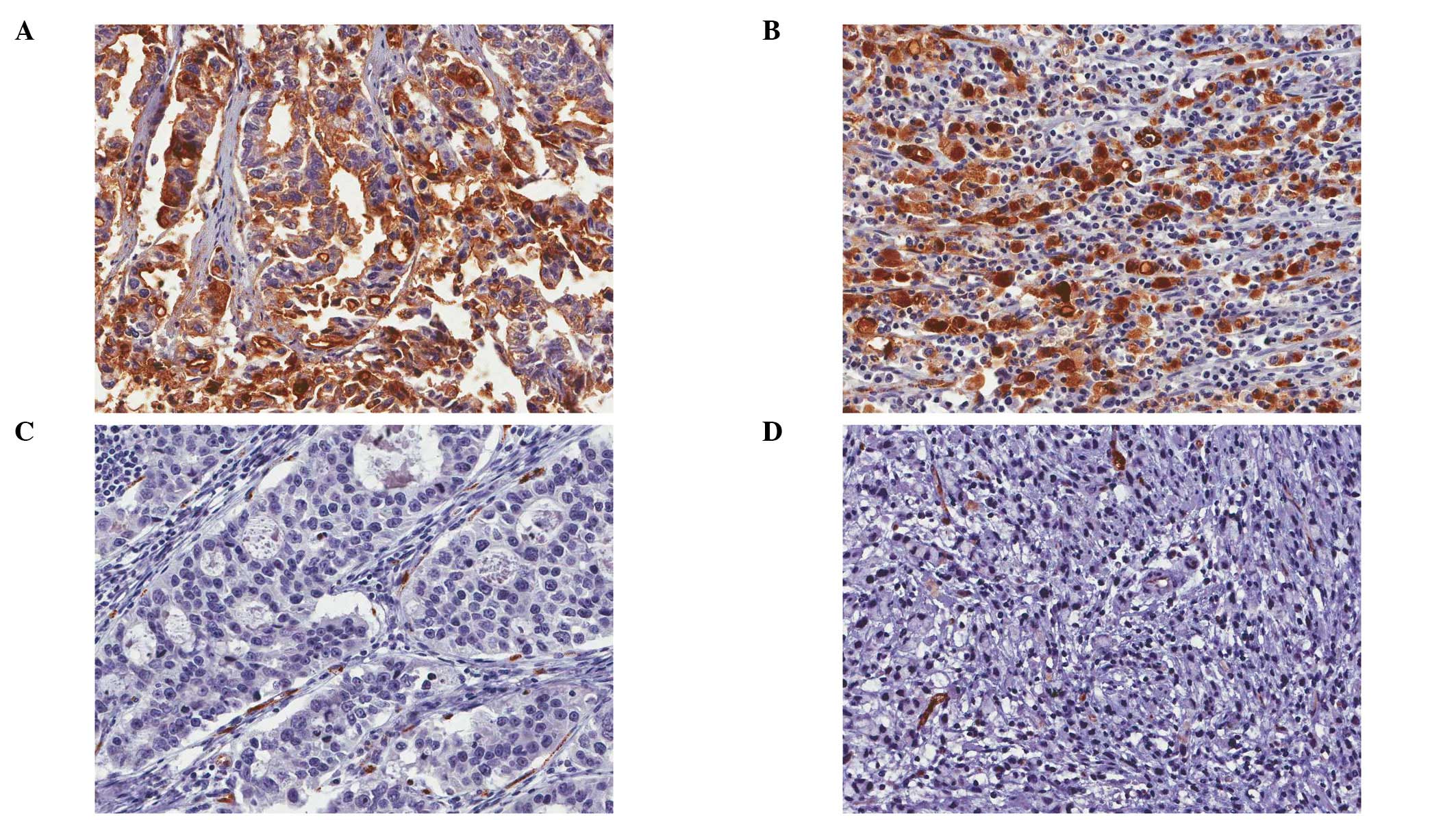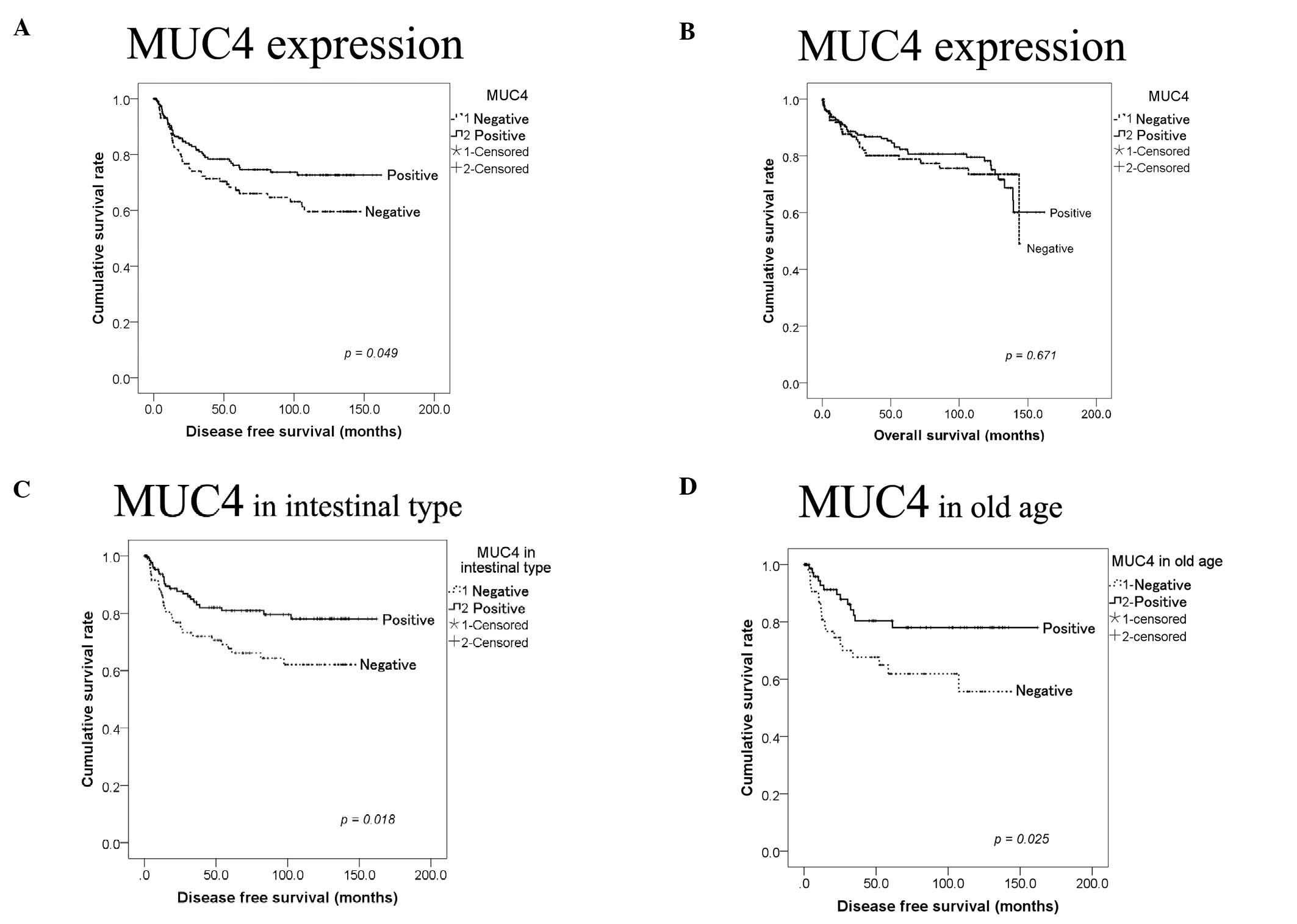|
1.
|
Li XH, Zheng HC, Wang ZG, et al: The
clinicopathological and prognostic significance of MUC-1 expression
in Japanese gastric carcinomas: an immunohistochemical study of
tissue micro-arrays. Anticancer Res. 28:1061–1067. 2008.PubMed/NCBI
|
|
2.
|
Hollingsworth MA and Swanson BJ: Mucins in
cancer: protection and control of the cell surface. Nat Rev Cancer.
4:45–60. 2004. View
Article : Google Scholar : PubMed/NCBI
|
|
3.
|
Zheng H, Takahashi H, Nakajima T, et al:
MUC6 down-regulation correlates with gastric carcinoma progression
and a poor prognosis: an immunohistochemical study with tissue
micro-arrays. J Cancer Res Clin Oncol. 132:817–823. 2006.
View Article : Google Scholar
|
|
4.
|
Cozzi PJ, Wang J, Delprado W, et al: MUC1,
MUC2, MUC4, MUC5AC and MUC6 expression in the progression of
prostate cancer. Clin Exp Metastasis. 22:565–573. 2005. View Article : Google Scholar : PubMed/NCBI
|
|
5.
|
Fattorossi A, Battaglia A, Malinconico P,
et al: Constitutive and inducible expression of the epithelial
antigen MUC1 (CD227) in human T cells. Exp Cell Res. 280:107–118.
2002. View Article : Google Scholar : PubMed/NCBI
|
|
6.
|
Pandey P, Kharbanda S and Kufe D:
Association of the DF3/MUC1 breast cancer antigen with Grb2 and the
Sos/Ras exchange protein. Cancer Res. 55:4000–4003. 1995.PubMed/NCBI
|
|
7.
|
Monges GM, Mathoulin-Portier MP, Acres RB,
et al: Differential MUC 1 expression in normal and neoplastic human
pancreatic tissue. An immunohistochemical study of 60 samples. Am J
Clin Pathol. 112:635–640. 1999.PubMed/NCBI
|
|
8.
|
Nakamori S, Ota DM, Cleary KR, Shirotani K
and Irimura T: MUC1 mucin expression as a marker of progression and
metastasis of human colorectal carcinoma. Gastroenterology.
106:353–361. 1994.PubMed/NCBI
|
|
9.
|
Khodarev NN, Pitroda SP, Beckett MA, et
al: MUC1-induced transcriptional programs associated with
tumorigenesis predict outcome in breast and lung cancer. Cancer
Res. 69:2833–2837. 2009. View Article : Google Scholar : PubMed/NCBI
|
|
10.
|
Moniaux N, Escande F, Porchet N, Aubert JP
and Batra SK: Structural organization and classification of the
human mucin genes. Front Biosci. 6:D1192–D1206. 2001. View Article : Google Scholar : PubMed/NCBI
|
|
11.
|
Ho SB, Niehans GA, Lyftogt C, et al:
Heterogeneity of mucin gene expression in normal and neoplastic
tissues. Cancer Res. 53:641–651. 1993.PubMed/NCBI
|
|
12.
|
Jeon JM, Lee HW, Park JY, et al:
Expression of MUC1 and MUC4 and its prognostic significance in
non-small cell lung carcinoma. Korean J Pathol. 44:397–403. 2010.
View Article : Google Scholar
|
|
13.
|
Shibahara H, Tamada S, Higashi M, et al:
MUC4 is a novel prognostic factor of intrahepatic
cholangiocarcinoma-mass forming type. Hepatology. 39:220–229. 2004.
View Article : Google Scholar : PubMed/NCBI
|
|
14.
|
Tamada S, Shibahara H, Higashi M, et al:
MUC4 is a novel prognostic factor of extrahepatic bile duct
carcinoma. Clin Cancer Res. 12:4257–4264. 2006. View Article : Google Scholar : PubMed/NCBI
|
|
15.
|
Saitou M, Goto M, Horinouchi M, et al:
MUC4 expression is a novel prognostic factor in patients with
invasive ductal carcinoma of the pancreas. J Clin Pathol.
58:845–852. 2005. View Article : Google Scholar : PubMed/NCBI
|
|
16.
|
Tsutsumida H, Goto M, Kitajima S, et al:
MUC4 expression correlates with poor prognosis in small-sized lung
adenocarcinoma. Lung Cancer. 55:195–203. 2007. View Article : Google Scholar : PubMed/NCBI
|
|
17.
|
Singh AP, Chauhan SC, Bafna S, et al:
Aberrant expression of transmembrane mucins, MUC1 and MUC4, in
human prostate carcinomas. Prostate. 66:421–429. 2006. View Article : Google Scholar : PubMed/NCBI
|
|
18.
|
Kwon KY, Ro JY, Singhal N, et al: MUC4
expression in non-small cell lung carcinomas: relationship to tumor
histology and patient survival. Arch Pathol Lab Med. 131:593–598.
2007.PubMed/NCBI
|
|
19.
|
Weed DT, Gomez-Fernandez C, Pacheco J, et
al: MUC4 and ERBB2 expression in major and minor salivary gland
mucoepidermoid carcinoma. Head Neck. 26:353–364. 2004. View Article : Google Scholar : PubMed/NCBI
|
|
20.
|
Alos L, Lujan B, Castillo M, et al:
Expression of membrane-bound mucins (MUC1 and MUC4) and secreted
mucins (MUC2, MUC5AC, MUC5B, MUC6 and MUC7) in mucoepidermoid
carcinomas of salivary glands. Am J Surg Pathol. 29:806–813. 2005.
View Article : Google Scholar : PubMed/NCBI
|
|
21.
|
Weed DT, Gomez-Fernandez C, Yasin M, et
al: MUC4 and ErbB2 expression in squamous cell carcinoma of the
upper aerodigestive tract: correlation with clinical outcomes.
Laryngoscope. 114:1–32. 2004. View Article : Google Scholar : PubMed/NCBI
|
|
22.
|
Yonezawa S, Goto M, Yamada N, Higashi M
and Nomoto M: Expression profiles of MUC1, MUC2, and MUC4 mucins in
human neoplasms and their relationship with biological behavior.
Proteomics. 8:3329–3341. 2008. View Article : Google Scholar : PubMed/NCBI
|
|
23.
|
Akyurek N, Akyol G, Dursun A, Yamac D and
Gunel N: Expression of MUC1 and MUC2 mucins in gastric carcinomas:
their relationship with clinicopathologic parameters and prognosis.
Pathol Res Pract. 198:665–674. 2002. View Article : Google Scholar : PubMed/NCBI
|
|
24.
|
Utsunomiya T, Yonezawa S, Sakamoto H, et
al: Expression of MUC1 and MUC2 mucins in gastric carcinomas: its
relationship with the prognosis of the patients. Clin Cancer Res.
4:2605–2614. 1998.PubMed/NCBI
|
|
25.
|
Westgaard A, Schjolberg AR, Cvancarova M,
Eide TJ, Clausen OP and Gladhaug IP: Differentiation markers in
pancreatic head adenocarcinomas: MUC1 and MUC4 expression indicates
poor prognosis in pancreatobiliary differentiated tumours.
Histopathology. 54:337–347. 2009. View Article : Google Scholar : PubMed/NCBI
|
|
26.
|
Shanmugam C, Jhala NC, Katkoori VR, et al:
Prognostic value of mucin 4 expression in colorectal
adenocarcinomas. Cancer. 116:3577–3586. 2010. View Article : Google Scholar : PubMed/NCBI
|
|
27.
|
Lopez-Ferrer A, de Bolos C, Barranco C, et
al: Role of fucosyltransferases in the association between apomucin
and Lewis antigen expression in normal and malignant gastric
epithelium. Gut. 47:349–356. 2000. View Article : Google Scholar
|
|
28.
|
Buisine MP, Devisme L, Maunoury V, et al:
Developmental mucin gene expression in the gastroduodenal tract and
accessory digestive glands. I. Stomach. A relationship to gastric
carcinoma. J Histochem Cytochem. 48:1657–1666. 2000. View Article : Google Scholar : PubMed/NCBI
|
|
29.
|
Senapati S, Chaturvedi P, Sharma P, et al:
Deregulation of MUC4 in gastric adenocarcinoma: potential
pathobiological implication in poorly differentiated non-signet
ring cell type gastric cancer. Br J Cancer. 99:949–956. 2008.
View Article : Google Scholar
|
|
30.
|
Moniaux N, Nollet S, Porchet N, Degand P,
Laine A and Aubert JP: Complete sequence of the human mucin MUC4: a
putative cell membrane-associated mucin. Biochem J. 338:325–333.
1999. View Article : Google Scholar : PubMed/NCBI
|
|
31.
|
Carraway KL III, Rossi EA, Komatsu M, et
al: An intramembrane modulator of the ErbB2 receptor tyrosine
kinase that potentiates neuregulin signaling. J Biol Chem.
274:5263–5266. 1999. View Article : Google Scholar : PubMed/NCBI
|
|
32.
|
Carraway KL, Ramsauer VP, Haq B and
Carothers Carraway CA: Cell signaling through membrane mucins.
Bioessays. 25:66–71. 2003. View Article : Google Scholar : PubMed/NCBI
|
|
33.
|
Jepson S, Komatsu M, Haq B, et al:
Muc4/sialomucin complex, the intramembrane ErbB2 ligand, induces
specific phosphorylation of ErbB2 and enhances expression of
p27(kip), but does not activate mitogen-activated kinase or protein
kinaseB/Akt pathways. Oncogene. 21:7524–7532. 2002. View Article : Google Scholar
|

















